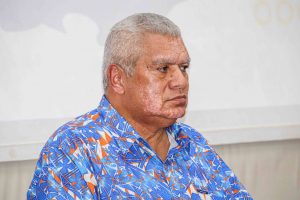
The Fiji National University (FNU) is proud to announce the transition of the College of Engineering, Science, and Technology (CEST) into the College of Engineering and Technical Vocational Education & Training (CETVET).
This strategic transition, effective this month, highlights FNU’s commitment to aligning with the goals of the Fiji Government outlined in the Fiji National Education Policy Framework 2024-2033.

Fiji National University (FNU) Vice-Chancellor, Professor Unaisi Nabobo-Baba.
FNU’s Vice-Chancellor, Professor Unaisi Nabobo-Baba stated that the transition underscores the University’s commitment to providing quality and accessible education in both TVET and higher education streams of learning.
“To further emphasise the University’s priority of providing TVET education, the FNU Council has approved the transition of the College of CEST into the College of Engineering and Technical Vocational Education and Training (CETVET) this month,” said Professor Nabobo-Baba.
“This change allows the University to align itself more closely with the Fiji National Education Policy Framework 2024-2033 and allows the University to support the Government’s quest for a skilled and future focused TVET workforce.”
As part of this transition, the University welcomes Mr Salabogi Mavoa as the Acting Dean of CETVET. Mavoa is a senior academic staff and once served as the Acting Dean of the former CEST.

Mr Salabogi Mavoa in his first official role as the Acting Dean of the CETVET, at the CETVET orientation last week.
“The College of Engineering and Technical Vocational Education and Training (CETVET) is dedicated to assisting the nation’s economic and social development by providing relevant, high-quality education and training and applied research with a beneficial societal impact,” said Mr Mavoa.
“The College’s goal is to produce graduates who are qualified with the right skills and are ready to be engaged in whatever field of work that they have been trained in.”
Additionally, this transition will help progress the University’s five-year plan to train 100,000 people through TVET by 2027.
The five-year plan, according to Pro-Vice-Chancellor TVET, Dr Isimeli Tagicakiverata, would assist the local workforce with the provision of skilled workers through TVET.

FNU’s Pro Vice Chancellor TVET, Dr Isimeli Tagicakiverata
“FNU responded to the government’s concerns of the skills gap issue and developed a five-year strategic plan to train 100,000 people through TVET. This strategy would assist the government of Fiji in training the right type and the right number of skilled people through TVET to work in the local industry.”
“We have been working in collaboration with industry stakeholders to understand their specific needs and working with our team in FNU to come up with relevant, competency-based programmes that will uplift the standard of the workforce.”